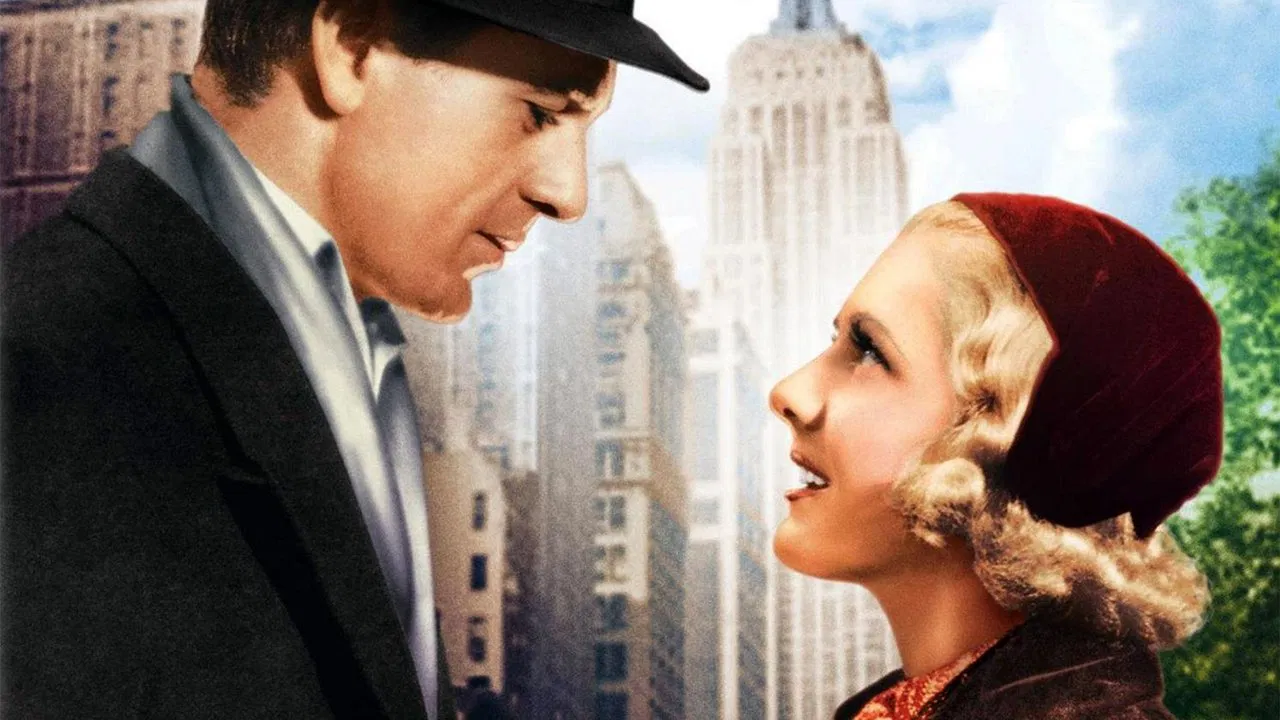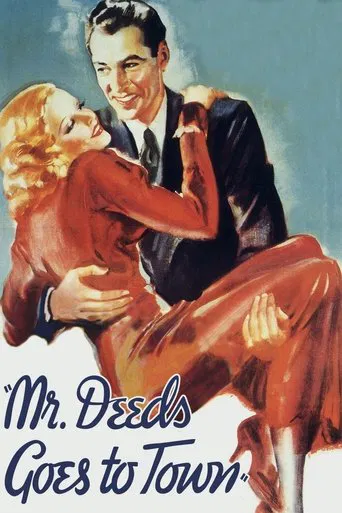

Very very predictable, including the post credit scene !!!
... View MoreI cannot think of one single thing that I would change about this film. The acting is incomparable, the directing deft, and the writing poignantly brilliant.
... View MoreOne of the best movies of the year! Incredible from the beginning to the end.
... View MoreI enjoyed watching this film and would recommend other to give it a try , (as I am) but this movie, although enjoyable to watch due to the better than average acting fails to add anything new to its storyline that is all too familiar to these types of movies.
... View MoreIt was perhaps inevitable that Frank Capra's "Mr. Deeds Goes to Town" should find itself on the list of my personal Top 10 Favorite Films. The director himself appears no fewer than five times on my list of Top 100 Favorite Films, more than any other director (with the exception of Billy Wilder), those films being "It Happened One Night" (1934), "Deeds," "You Can't Take It With You" (1938), "Mr. Smith Goes to Washington" (1939) and, of course, the perennial favorite "It's a Wonderful Life" (1946). The male lead of "Mr. Deeds," Gary Cooper, appears four times in my Top 100 Films list, not only in "Deeds," but also in "The Plainsman" (1936), "Sergeant York" (1941) and "High Noon" (1952). And as for the female lead in "Mr. Deeds," why, it is Jean Arthur, my favorite comedienne of the '30s and '40s, who, with her adorably cracked voice and clean-scrubbed good looks, appears more than any other actress in my Top 100: not only in "Mr. Deeds," "Mr. Smith," "The Plainsman" and "You Can't Take It With You," but also in Billy Wilder's wonderful 1948 offering "A Foreign Affair," as well as in George Stevens' classic 1953 Western "Shane," which would be Arthur's final film. Anyway, as I say, with all those favorite talents both behind and in front of the camera, perhaps it was a foregone conclusion that I would love "Mr. Deeds," and such is surely the case. The film has been a personal favorite of this viewer for almost 40 years now, ever since I first saw it on television back in the mid-'70s. Since that time, I have seen it repeatedly on VHS, DVD and the big screen, and the film never fails to both charm and elicit big laughs. For me, it is Capra's finest piece of work, in a career filled with so many gems.For those of you who may be unfamiliar with the story line of this wonderful picture (and it is a pretty complex one, with multiple plot threads that I will endeavor to summarize in a nutshell), it introduces us to a very special inhabitant of (the fictitious small town of) Mandrake Falls, Vermont. He is Longfellow Deeds (Cooper), an amateur tuba player (whose favorite melody to toot out is apparently "For He's a Jolly Good Fellow," which becomes the theme song of the film) and greeting-card writer, who, to his vast amazement, is made the heir of $20 million by a deceased uncle. Deeds, after inheriting this enormous windfall, is brought to NYC and is subjected by various interests to all manner of pressures. Distant relatives crawl out of the woodwork, hoping for a share of the loot, while a large newspaper sends reporter "Babe" Bennett (Arthur) to get the scoop on what makes Deeds tick. Pretending to be a destitute and homeless woman named Mary Dawson, Babe works her way into Deeds' confidence, meanwhile writing a series of articles mocking his eccentric ways (such as jumping on a speeding fire truck for a ride) and dubbing him the "Cinderella Man." The innocent Deeds quickly falls in love with Mary (who wouldn't?), and is fairly devastated when he eventually learns the truth about her. Ultimately, he decides to give all his money away to the poor and needy, in the form of 10-acre farm plots that the destitute will tend for a period of three years, after which the land will be theirs. This, naturally, causes an outrage amongst the various interested parties, resulting in a courtroom hearing to determine Deeds' very sanity. Sunk in despair over both Mary and this disheartening turn of events, Deeds cannot even offer a word in his own defense, but ultimately does manage to rally and rise to the occasion...."Mr. Deeds," surprisingly enough, was only a moderate box office success after its initial release in April 1936, although it did garner several Oscar nominations and did manage to cop Capra his second Academy Award for Best Director. The film was nominated for Best Picture, ultimately losing to "The Great Ziegfeld" (highway robbery, sez me), and Cooper was nominated for the first of five times as well, losing to Paul Muni's performance in "The Story of Louis Pasteur" (still haven't seen that one, so I cannot comment on whether or not Cooper was robbed or not). It is difficult to say just why the film was not more profitable at the time, although today it is deemed something of a comedy classic, even generating a 2002 remake starring Adam Sandler. (Nope, haven't seen it, and don't need to.) It certainly was not due to a lack of star power, as Cooper and Arthur were both never better than they are here. Arthur plays almost two separate roles in the film: the "sweet and innocent" Mary, as well as the tough-as-nails reporter. She is absolutely wonderful, and it is very hard to imagine the part being played by Carole Lombard, as great a comedienne as SHE was; Lombard was the intended actress for the role, but dropped out to appear in the equally classic '30s comedy "My Man Godfrey." And Cooper is just as ingratiating as can be, with his handsome Montana looks, sweet and gentle demeanor, and soft-spoken vocal delivery. How wonderful he is in the scene in which he gives a recently dispossessed farmer a meal in his palatial digs, and first gets the idea to help the impoverished with his vast fortune! This is a film that plays into what must be a very common fantasy for all of us: What would I do if I ever won a fortune in money? Would I spend it all on myself, give it all away to charity, lavish it on my friends, or what? As this film shows us, being charitable with a huge sum of money is not so simple a proposition as it initially appears."Deeds" also boasts a truly winning script from Robert Riskin, the screenwriter who collaborated with Capra on so many winning films over the course of three decades: "Lady for a Day" (1933), "It Happened One Night," "Broadway Bill" (1934), "Lost Horizon" (1937), "You Can't Take It With You," "Meet John Doe" (1941, and featuring still another wonderful Cooper performance), and finally, "Pocketful of Miracles" (1961)...not to mention another of my personal favorite films of the 1930s, "The Whole Town's Talking," which Riskin penned for John Ford; a film starring the great Edward G. Robinson in a double role, as well as Jean Arthur in her breakthrough. The film manages to deliver any number of wonderful scenes, the most touching of which being the one in which Longfellow Deeds reads a love poem that he has written to Mary, and then abruptly runs away in embarrassment, knocking over a garbage can in the process; the funniest of which perhaps being that lengthy sanity hearing, in which two very eccentric biddies from Mandrake Falls give evidence to support the notion that Deeds truly is what they call "pixilated." The picture features a raft of wonderful supporting players who add immeasurably in putting the whole conceit over, including the ubiquitous Charles Lane as a seedy lawyer; the dependably hissable Douglas Dumbrille, who has rarely been better, here as Cedar, the manipulative attorney of Deeds' late uncle; gravel-voiced Lionel Stander, as the person who is picked by Cedar to chaperone Deeds around and keep him out of trouble in the big city (good luck with that!); and Mayo Methot (who would go on to be Mrs. Humphrey Bogart from 1938 - '45), here playing a grasping relative of Longfellow, and the person who starts the ball rolling on his sanity hearing. But the bottom line is that the qualities that truly put "Mr. Deeds" over are charm, sweetness and big laughs in abundance. Some may refer to it using the old and cliched put-down "Capra-corn," but for this viewer, it is a genuine crowd-pleaser that is well near impossible to resist. "It Happened One Night" might have won more Oscars, and "It's a Wonderful Life" might be the fan favorite in this modern-day 21st century, but for me, "Mr. Deeds" is still at the head of the pack. For he's a jolly good fellow, indeed!
... View MoreFrank Capra classic about a good-natured small town man named Longfellow Deeds (Gary Cooper) who inherits a fortune and finds himself surrounded by opportunists in the big city. Iconic role for Gary Cooper, who's in his element playing an upright, unassuming guy who gets a crash course in the cynical ways of the world. Jean Arthur, charming and lovely as ever, is splendid as the reporter covering Deeds, at first intent on making fun of him like he's a country bumpkin, only to find herself gradually falling in love with him. As usual with Frank Capra's movies, the supporting cast is made up of excellent character actors like George Bancroft, Lionel Stander, Ruth Donnelly, Douglas Dumbrille, and H.B. Warner. A delightful jewel in the crown of Capra, one of my favorite directors and one who is sadly all-too-often dismissed by film snobs. This is a great one that definitely belongs in the "they don't make 'em like this anymore" category. See the crappy Adam Sandler remake for proof of that.
... View MoreFrank Capra mark is, always, strong guarantee for a movie. this case is not an exception. but it remains special. not only for script, performances or director but for a strange result. the script is far to be coherent, the events are not realistic. but the errors are its virtue. because it has the perfect cast, the high ambition level and a story for everyone. a social message is mixed with crumbs from Don Quijote. and the result has splendid effect. a film about innocence and descending in heart of cruel town. a memorable speech in American spirit. an ambiguous character because Deeds remains a shadow. the love who brakes all. an useful film for convert the fear, to create the hope in the best form. that is all. and the key for a great success.
... View MoreFrank Capra struck gold again in this hilarious and heartfelt comedy/drama starring Gary Cooper as Longfellow Deeds, a simple(yet shrewd) small-town Vermont resident who inherits a great deal of money from his uncle. He moves to the city, where he quickly becomes the target of moochers and swindlers, whom he unexpectedly outwits, but meets his match in cynical female reporter Babe Bennett(played by Jean Arthur) who fools Deeds into thinking she loves him, and gets exclusive material for her cruel headlines. When his right-hand man Cornelius Cobb(wonderfully played by Lionel Stander) wises him up about her, he becomes despondent, and becomes a target by those who claim he is insane in order to take the money away from him. Strange thing happened though: Babe realizes that she really does love him...Classic comedy is a complete joy from start to finish, with outstanding direction and performances, and an original and insightful script with many pertinent things to say about wealth and sanity, sincerity and phoniness that are just as true today. Not to be missed.
... View More